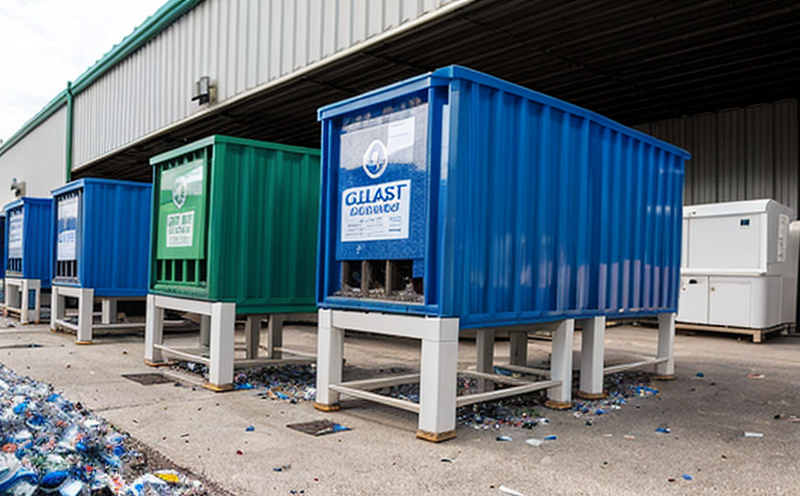EN 12932 Ceramic Waste Tensile Strength
The EN 12932 standard provides a comprehensive framework for assessing the tensile strength of ceramic waste materials. This test is pivotal in ensuring that recycled ceramics meet the necessary standards for re-use and integration into new products, thus promoting sustainable practices within the waste management sector.
When it comes to recycling ceramic waste, understanding its physical properties through tests like EN 12932 is crucial. The tensile strength of a material is a key indicator of its durability and integrity under stress conditions. For ceramics used in construction or manufacturing applications, this metric ensures that recycled materials can be safely incorporated into new products without compromising structural integrity.
The test method outlined in EN 12932 involves the preparation of cylindrical specimens made from crushed ceramic waste. These samples are then subjected to tensile loading until failure occurs. The maximum load at which fracture takes place is recorded as the tensile strength. This value provides valuable insights into how well the material can withstand mechanical stress, which is essential for manufacturers looking to incorporate recycled ceramics into their production processes.
By adhering to this standardized procedure, laboratories ensure consistency and accuracy across various testing facilities, allowing stakeholders involved in waste management and recycling initiatives to make informed decisions based on reliable data. Furthermore, compliance with such standards helps build trust among all parties concerned about environmental impact reduction efforts aimed at achieving circular economy goals.
The importance of this test cannot be overstated, especially considering its role in fostering responsible resource use through effective waste management strategies. It plays a critical part not only in evaluating the quality of recycled materials but also in promoting innovation within industries reliant on sustainable sourcing practices.
Why It Matters
The implementation of EN 12932 Ceramic Waste Tensile Strength testing is significant for several reasons. Firstly, it ensures that the recycled ceramics used in various applications meet the required quality standards, thereby enhancing overall product performance and reliability.
- Enhanced durability: By measuring tensile strength according to this standard, manufacturers can be confident about using high-quality recycled materials which are capable of withstanding stress without failure.
- Promotes sustainability: This testing contributes significantly towards achieving sustainable development goals by encouraging the reuse and recycling of waste materials instead of disposing them as landfill.
- Cost efficiency: Properly tested ceramics lead to cost savings in production processes since they eliminate the need for additional raw material inputs while maintaining or even improving product quality.
In summary, compliance with EN 12932 helps establish trust among stakeholders involved in waste management and recycling initiatives. It provides a robust foundation upon which more advanced technologies can be built to further enhance resource efficiency and minimize environmental impacts associated with traditional linear economic models.
Benefits
- Improved product quality: Ensures that recycled ceramics used in construction or manufacturing applications meet stringent quality standards, leading to enhanced durability and reliability of end products.
- Sustainable resource utilization: Encourages the reuse and recycling of waste materials instead of disposing them as landfill, thereby promoting a circular economy approach.
- Cost savings: By utilizing properly tested recycled ceramics, manufacturers can reduce costs associated with purchasing new raw materials while maintaining or even improving product quality.
The benefits extend beyond just these points; they also include reduced energy consumption during manufacturing processes due to lower heating requirements when working with preprocessed recycled material compared to virgin raw materials. Additionally, compliance with standards like EN 12932 fosters innovation within industries reliant on sustainable practices by providing a reliable basis for further advancements.
Industry Applications
| Application Area | Description |
|---|---|
| Construction | Ceramic waste from demolition sites can be recycled and used as aggregates in concrete mixes, reducing the demand for virgin aggregate materials. |
| Manufacturing | Recycled ceramics are suitable for use in various manufacturing processes where high-strength and durability are required. For instance, they may replace traditional clay-based products in the production of tiles or bricks. |
| Sustainable Product Development | This testing method plays a crucial role in developing new products that incorporate recycled ceramics into their design, contributing to circular economy principles. |
The application areas listed above illustrate the versatility and potential of recycling ceramic waste through tensile strength testing. By adhering to standards like EN 12932, stakeholders in these sectors can ensure that recycled ceramics are suitable for use in diverse applications while minimizing their environmental footprint.





